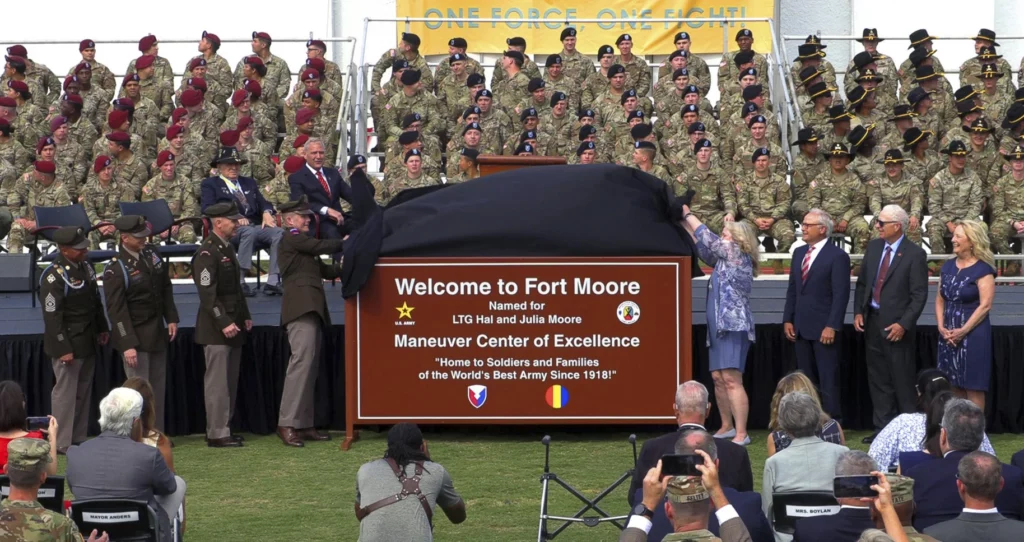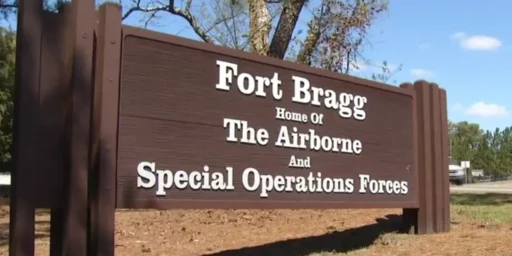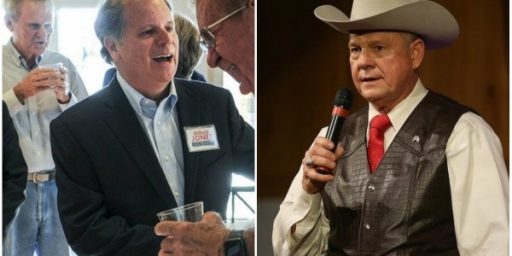Fort Benning Now Officially Fort Moore
The "We Were Soldiers Once" author and his wife have been honored.

AP (“Army officially designates Fort Moore, dropping Confederate name Benning“):
The Army’s training hub in Georgia was renamed Fort Moore during a ceremony Thursday, replacing the name of a Confederate officer that had adorned the base for more than a century with that of a decorated Vietnam War commander and his wife.
The name change for the post formerly known as Fort Benning had been in the making for more than a year, since an independent commission recommended in May 2022 renaming nine of its bases commemorating Confederate officers.
Soldiers and dignitaries attended a ceremony Thursday unveiling the new sign that will stand outside the base headquarters. The post commander, Maj. Gen. Curtis Buzzard, welcomed attendees for the first time to Fort Moore, named in honor of the late Lt. Gen. Hal Moore and his wife, Julia Moore.
Located just outside Columbus, the Georgia base trains soldiers to fight in the infantry, to serve in tank crews and is home to the elite Army Ranger School. Roughly 70,000 soldiers and civilian workers are stationed there.
The name Fort Moore marks the first time the Army has named a base in honor of a married couple.
Hal Moore served in Vietnam as commander of a cavalry battalion based at Fort Benning and was awarded the Distinguished Service Cross. Julia Moore successfully lobbied the Pentagon to adopt a policy that military families would be notified of war casualties in person rather than by telegram.
“Together Hal and Julie Moore embody the very best of our military and our nation,” Buzzard told the ceremony crowd. “And the renaming of this installation as Fort Moore is a fitting tribute to their lifelong dedication to the Army and its soldiers and their families.”
Founded in 1918 as Camp Benning, the Georgia base had long been named for Henry L. Benning, a justice on the Georgia Supreme Court who vocally supported secession after Abraham Lincoln won the presidency in 1860. Benning joined the Confederate Army during the Civil War and rose to the rank of brigadier general.
The name changes are part of a broader effort by the U.S. military to confront racial injustice. The Pentagon in January ordered that the names of Confederate officers and soldiers be stripped from bases, ships, streets and other places by the end of the year.
Some of the changes have already been completed. Fort Pickett in Virginia became Fort Barfoot in March. And Fort Hood, Texas, was renamed Fort Cavazos on Tuesday.
Others will soon follow. Fort Bragg in North Carolina will be redesignated Fort Liberty next month. Later this year in Georgia, Fort Gordon outside Augusta will be renamed for former President Dwight Eisenhower, who served as a five-star Army general. No date has been set.
The Columbus Ledger-Enquirer (“Fort Benning is now Fort Moore. Name change celebrated in ceremony at Doughboy Stadium“) adds:
The hour-long ceremony took place in Doughboy Stadium on the base. The stadium was the location from where Moore shipped out to war, which has since been memorialized in the film We Were Soldiers.
Speakers at the ceremony included Major General Curtis A. Buzzard, Moore’s former company commander and the fort’s current commander, retired Colonel Tony Nadal and Moore’s son, retired Colonel David Moore.
“If you have to go to war, you want to go with the best. We did,” said Nadal. He called Moore “the greatest soldier he’s ever known.”
“He was a tremendous leader. He led by example. He wouldn’t ask his men to do anything he wouldn’t do himself,” said retired Colonel and Medal of Honor recipient Walter Marm.
Maj. Gen. Buzzard had said the name change may be “the most culturally significant event of my Army career,” according to original reporting by the Ledger-Enquirer.
Fresh out of Officer Candidate School (OCS), Marm was sent to Ia Drang in Vietnam, where he served under Moore.
“We thought we were at another Little Big Horn, surrounded and outnumbered… but we had more assets than Custer had,” said Marm. The battle of la Drang become one of the Vietnam War’s most iconic battles.
As Moore fought alongside men like Nadal and Marm, his wife Julia fought for the families of those who lost their loved ones thousands of miles away.
Julia Moore, horrified that fallen soldiers loved ones were being notified by telegrams delivered by taxi drivers, personally comforted the widows and attended their funerals.
Her efforts helped change the policy of how the Army deliver death notices, which is still in effect today, according to an informational pamphlet provided by event staff.
[…]
Moore fought against racial inequities throughout his career. Early on while at West Point Moore threatened to boycott a celebration if a Black graduate was excluded. Cadet Ernie Davis and his family participated like everyone else.
In 1970 Moore helped remedy a situation in Korea where Black soldiers had rebelled due to discriminatory treatment. Moore removed racist non-commissioned officers and established basic principles for fair treatment.
Stars and Stripes (“‘Our name may be changing, but our mission is not’: Army’s Fort Benning is now Fort Moore“) adds:
“Lt. Gen. Hal and Julia Moore were courageous leaders and visionaries whose lives exemplified duty, honor and country, and each time we pass through the gates [of Fort Moore] their legacy will inspire us,” said Maj. Gen. Curtis Buzzard, the top commander of Fort Moore and its Maneuver Center of Excellence. “The home of the infantry and armor forces will now be named after two people who not only embodied but demonstrated the Army values — one on the battlefield, [and] the other on the home front.
“Fort Moore is a name our soldiers and our mission deserve because when recruits sign on to be all you can be in the Army, they come here to be more.”
[…]
The Moores spent portions of Hal’s military career at Fort Benning, where they are buried in the post cemetery. They were chosen for the honor as a husband-and-wife unit to honor the importance of the Army family, according to the panel that selected new names for Fort Benning and eight other Army installations in the South.
I was a bit dubious when it was originally announced that the base would be renamed after Hal and Julia Moore but get why the Army would want to honor them both. Certainly, they’re more deserving of the honor than Henry Benning, whose military service was short and in the Confederate Army, not that of the United States.
I graduated from Airborne school at then-Fort Benning in 1989 and from the Air Assault School at then-Fort Rucker in 1987. The latter was renamed “Fort Novosel,” in honor of Medal of Honor recipient Chief Warrant Officer 4 Michael Novosel, last month.





It’s great to see these installations re-named for real American heroes rather than traitor generals who served in an enemy army.
What an enlightened choice. A bit like the First Lady predicament, a soldier’s spouse has a job in which there is a lot of work and a lot of stress and little compensation. The general was evidently an exemplary officer and a real mensch as well. And critically he fought for the United States, something that really ought to be a given in naming bases. (Fort Rommel? Fort Ho Chi Minh?) Well done, Army.
Because of the book and movie, Hal and Julia Moore are pretty well known. I’m concerned about some of the other re-namings, since they’re named for persons who, while deserving, are forgettable. It’s a pity.
And if you want to read about CWO4 Michael Novosel, here is his Wikipedia page.
It really is quite extraordinary and a military career path that probably couldn’t be duplicated today.
I’m 100% in favor of this. Having said that, I have some sympathy for Southerners on this whole process. From childhood they were taught lies about the Civil War and the heroism of their military leaders. It must be jarring to see these heroes (who everyone they know agrees were the noblest of men) struck down.
When I was a kid I went to Catholic school for 1st through 8th in a parish and school named for a specific saint. While I was there the Vatican did a big review of all the saints and purged a bunch that didn’t really qualify or, in some cases, were probably mythical. I don’t remember why, but our saint got purged. I have no idea if the Vatican was right or wrong in their criteria but that didn’t matter. Virtually every kid in that school was pissed.
Fort Liberty is a tad lame, otherwise well done. And overdue …
I dont have any sympathy for southerners on this issue. Few people really know much anymore about the southern generals for which the forts were named. Anyone who would have served with them is dead. Some of them were pretty mediocre generals so just like today a number were chosen based on influence and politics. Naming them after people who were actual heroes or made major contributions is much better. (Mrs Moore’s contribution is greatly appreciated. If you have deployed overseas to a war zone you know that your spouse is terrified you wont return. To receive such bad news from some taxi driver handing you a telegram is not what military spouses deserve.)
Steve
@steve:
Being on that kind of notification detail cannot be fun for a soldier. Not as bad as burial detail, but bad. I’d almost rather be taking fire.
Moore is a great choice!